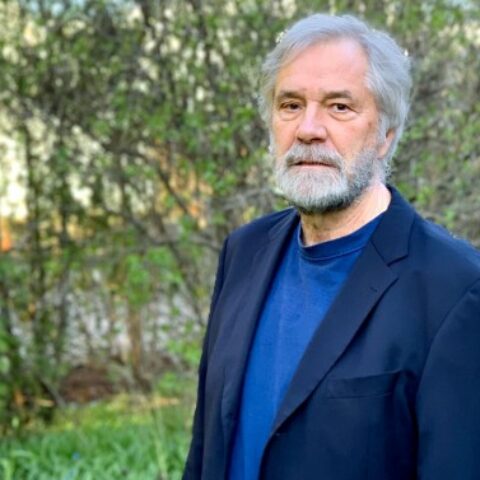Gift endows, names Cornell Jeb E. Brooks School of Public Policy

By James Dean
A major gift will endow and name the Cornell Jeb E. Brooks School of Public Policy, advancing the nascent school’s long-term mission to help solve complex global policy challenges, from inequality to sustainability.
The gift from Jeb E. Brooks,c MBA ’70 – an advocate for socially responsible investment whose late father taught at Cornell and whose Big Red roots span three generations – and his wife, Cherie Wendelken, together with the Brooks Family Foundation, provides an early boost to help the school achieve world-class excellence in public policy. The Cornell Board of Trustees approved the naming in March.
“This important gift positions the Cornell Brooks School for success right out of the gate, enabling the kind of cutting-edge policy research, education and outreach that will significantly improve people’s lives,” said President Martha E. Pollack. “We’re so grateful to Jeb and Cherie for sharing and supporting our vision for this school, and for their deep and longstanding commitment to Cornell – as students, faculty and alumni.”
A finance professional who grew up in Ithaca and now lives in Portland, Maine, Brooks is confident the university will create a school of international importance and influence in public policy, as it has already done in other key areas. His family’s gift establishes an endowment that will grow over time with others’ participation, and will also, in the short term, help the school strengthen its academic programs and recruit new faculty.
Wendelken holds a Ph.D. in architectural history from the Massachusetts Institute of Technology and was a professor in Harvard University’s Department of History of Art and Architecture. Twenty years ago, she and Brooks established the Brooks Family Foundation, which focuses on health care, underserved children and the environment.
Brooks said his father, Earl Brooks, who in 1947 began a nearly half-century career as a Cornell business professor, showed him the effect of the university’s commitment to developing an impactful school of business education and research, now known as the Cornell SC Johnson College of Business.
“I see that same great potential for the future of the School of Public Policy, affecting practices for the common good,” he said. “I am particularly honored to support the creation of an institution dedicated to improvement in areas of sustainability, climate change and social responsibility.”
The new public policy school, announced last year and expected to formally open this summer, is the highest-profile initiative to emerge from a multiyear review of opportunities to elevate Cornell’s excellence and impact in the social sciences, led by Provost Michael I. Kotlikoff.
The university’s goal is to harness and develop its wide-ranging expertise in policy scholarship, teaching and engagement, which has long been dispersed across campus, into a single, world-class entity.
“We have been laying the groundwork for a school that can become a prominent addition to the global policy stage, building upon Cornell’s existing deep strength in public policy and related disciplines,” Kotlikoff said. “The Brooks family’s remarkable support while the school is still being formed is a testament both to their vision and to the school’s great promise and ambition.”
The historic gift comes as a faculty committee works to develop the Cornell Brooks School’s academic programs and its administrative structure takes shape. Founding faculty will include the faculty of the Department of Policy Analysis and Management in the College of Human Ecology along with policy-oriented faculty from the Department of Government in the College of Arts and Sciences and other key departments across the university. This fall, undergraduates in policy analysis and management and health care policy in the College of Human Ecology will also become part of the new school, along with graduate students enrolled in the Cornell Institute for Public Affairs and the Sloan Program in Health Administration.
Through an interdisciplinary and problem-oriented study of public policy, the Cornell Brooks School will explore how government choices intersect with people’s lives. Initial areas of focus will include data science and technology policy; environmental and sustainability policy; health policy; human security; inequality and social policy; the politics and economics of development; and race, racism and public policy.
Brooks said Cornell’s research emphasis on data- and evidence-based analysis is well suited to improving public policies affecting the environment and governance. Based on his career in finance, he also hopes the school will help create frameworks for socially responsible investment.
“It’s important that Cornell produce leadership to help implement such policies,” he said.
After receiving his MBA from Cornell in 1970, Brooks founded Equity Resources Group, a real estate-focused private equity firm located in Cambridge, Massachusetts. In the late 1980s, he helped found KLD Research and Analytics, which launched Domini Social Investments, one of the first investment firms focused on environmental, social and governance issues. More recently, Brooks helped start The Investment Integration Project, an investment research firm that encourages mitigation of system-level risks such as climate change and global wealth inequalities.
Brooks said the gift brings him full circle, in a way: He was part of the charter class of Cornell’s nursery school that was housed in Martha Van Rensselaer Hall, the building that will serve as the initial home for the policy school bearing his name. Over the next decade or so, he expects the school to be recognized as an institution of global prominence.
“These are challenging times,” Brooks said. “When I first learned about the new school, I was drawn to Cornell’s vision of creating a multidisciplinary institution to help world societies become safer, more just and sustainable.”
